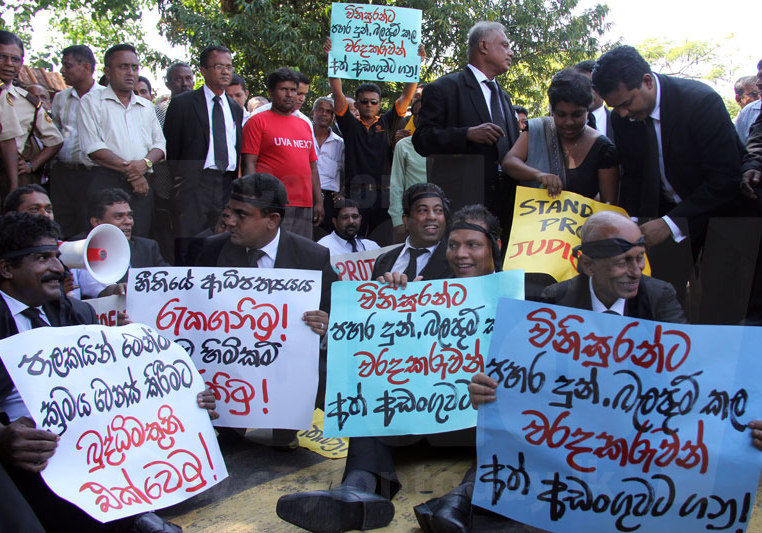The ICJ urges the Human Rights Council to establish an international commission of inquiry to investigate alleged violations of international human rights and humanitarian law in Sri Lanka.
“The Sri Lankan justice system can no longer ensure accountability for human rights violations and war crimes,” said Sam Zarifi, ICJ Asia Pacific Regional Director. “The judiciary has been stripped of its independence and impartiality, and lawyers continue to be intimidated, harassed and subjected to improper interference.”
The ICJ welcomes the UN High Commissioner’s report on Sri Lanka released yesterday.
In the report, Navi Pillay notes with concern that the Government of Sri Lanka has failed to make any significant progress in any of the areas of concern she had highlighted in her oral update to the Human Rights Council in September 2013.
The Government has failed to show any progress towards a credible national investigation process with tangible results, including the prosecution of perpetrators of serious violations of human rights and international humanitarian law; failed to address the serious and ongoing problem of enforced disappearances; failed to set a clear timeline for the disengagement of the military from activities that should be civilian; failed to prosecute a single incident of violence against journalists and human rights defenders; and failed to take measures to address the increasing attacks against religious minorities.
The High Commissioner remarked that ‘national mechanisms [in Sri Lanka] have consistently failed to establish the truth and achieve justice.’
A briefing paper prepared jointly with the International Bar Association published today (see below) explains how ongoing attacks on the judiciary and legal profession have undermined the rule of law and resulted in a general failure of the Sri Lankan justice system to ensure accountability for human rights.
“Judges and lawyers are routinely subjected to intimidation, hindrance, harassment, and improper interference,” Zarifi added. “In the last 18 months, we are aware of at least 10 incidents against judges and lawyers and to date, no one has been prosecuted for these attacks.”
More than a year after the highly politicized impeachment of the 43rd Chief Justice Dr Shirani Bandaranayake, there continues to be no transparent, independent, impartial and fair procedure for the removal or discipline of judges in Sri Lanka.
Pursuant to its legal obligations under the International Covenant on Civil and Politicial Rights, as elaborated on by the UN Basic Principles on the Independence of the Judiciary, Sri Lanka must take measures to ensure the judiciary is protected from improper influences, inducements, pressures, threats and interferences.
The appointment process for the judiciary must be based on integrity and ability and there must be safeguards against judicial appointments for improper motives.
“The 18th Amendment, which endows President Mahinda Rajapaksa unilateral authority to make judicial appointments has cleared the way for a politicized appointments process, where appointments are made on the basis of loyalty and personal patronage rather than seniority, integrity and proven competence,” said Zarifi.
“What we are left with is a judiciary that is no longer capable of achieving justice and ensuring accountability for human rights violations.”
The High Commissioner concluded that in the absence of a credible national process, ‘the international community has a duty to take further steps, which will advance the right to truth for all in Sri Lanka and create further opportunities for justice, accountability and redress.’
The ICJ supports the recommendations in the High Commissioner’s report and calls on the member States of the Human Rights Council to establish an international independent commission of inquiry to investigate allegations of violations of human rights and humanitarian law in Sri Lanka.
Contact:
Sam Zarifi, ICJ Asia Pacific Regional Director, (Bangkok); t: +66 807819002; email: sam.zarifi(a)icj.org
Sheila Varadan, ICJ Legal Advisor, South Asia Programme (Bangkok), t: +66 857200723; email: sheila.varadan(a)icj.org
Background
The United Nations High Commissioner for Human Rights issued its Report pursuant to Human Rights Council Resolution 22/1, which encouraged the Government of Sri Lanka to implement the constructive recommendations of the Lessons Learnt and Reconciliation Commission, to implement the recommendations of the 2013 report of the United Nation High Commissioner for Human Rights on Sri Lanka, as well as conduct an independence and credible investigation into allegations of violations of international human rights and humanitarian law.
At the September 2013 session of the Human Rights Council, the ICJ delivered a statement saying, “We look forward to the presentation of a comprehensive report from the High Commissioner at the 25th session and urge the Council to prepare to take action at that time if the Government continues to fail to take concrete steps to ensure justice and accountability for alleged violations of international human rights law and humanitarian law in Sri Lanka.”
Sri Lanka-Rule of Law undermined-Advocacy-analysis brief-2014 (download Advocacy Note in English pdf)
Sri Lanka-Rule of Law undermined – Advocacy-analysis brief 2014 -Fr (download Advocacy Note in French pdf)
Sri Lanka-Rule of Law undermined – Advocacy-analysis brief 2014-Sp (download Advocacy Note in Spanish pdf)
Sri Lanka-Rule of Law undermined – Advocacy-analysis brief 2014-Ar (download Advocacy Note in Arabic pdf)

